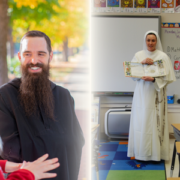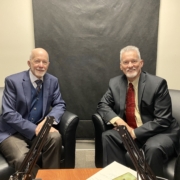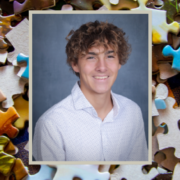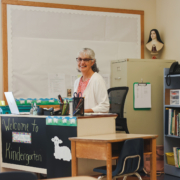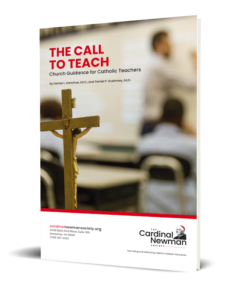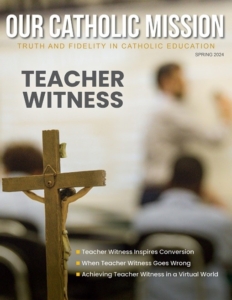Marriages, Religious Vocations Fostered at Newman Guide Colleges
While Catholic marriages and religious vocations are declining in the United States, Newman Guide Recommended colleges are bucking this trend. Catholic families should seek out these faithful colleges where students are prepared not only for career but also for vocation—including marriage, single life, the priesthood, and religious life.
Forming husbands and wives
Catholic marriage is in crisis. The number of Catholic marriages in the United States declined 77 percent from 426,309 in 1969 to 98,354 in 2021—even though the total number of Catholics grew during the same time period. In a 2015 study by the Pew Research Center, a majority of Catholics approved of cohabitation without marriage.
Faithful Catholic education, however, is ordered toward God’s calling for every student. Newman Guide Recommended colleges teach the truth and beauty of family, and professors and staff witness to the sanctity of marriage. The campus life and student culture are conducive to good friendships and growth in virtue. Students are encouraged to discern their vocations, especially through frequent access to the sacraments, Eucharistic adoration, and prayer.
All these factors contribute to the impressive rates of married alumni who met their spouses while attending Newman Guide institutions, including:
- 30 percent at Wyoming Catholic College in Lander, Wyo.,
- 29 percent at Thomas Aquinas College in Santa Paula, Calif., and Northfield, Mass.,
- 28 percent at Christendom College in Front Royal, Va.,
- 25 percent at Our Lady Seat of Wisdom College in Barry’s Bay, Ontario,
- 25 percent at ITI Catholic University in Trumau, Austria,
- 19 percent at John Paul the Great Catholic University in Escondido, Calif.,
- 15 percent at University of Dallas in Irving, Tex.,
- 14 percent at Ave Maria University in Ave Maria, Fla.,
- 13 percent at Benedictine College in Atchison, Kan.,
- 5 percent at the University of Mary in Bismarck, N.D., and
- 4 percent at the University of St. Thomas in Houston, Tex.
“Attending a Newman Guide college with its promotion of the sacramental life, faithfulness to the Magisterium, and flowering of Catholic culture increases grace in one’s soul, but also increases one’s odds to find a holy spouse,” argues Patrick O’Hearn, author of Courtship of the Saints: How the Saints Met their Spouses.
“Often, young people are so focused on pursuing their occupation rather than their vocation,” O’Hearn says. “Our occupation is always at the service of our vocation… Our first vocation is to be holy. How we live out that vocation (as a priest, consecrated religious, or married) is our second most important calling.”
Religious vocations flourish
In 1970, there were about 800 ordinations to the Catholic priesthood, and today there are only about half that amount. It’s an even bleaker story for religious sisters: a decline from 160,000 in 1970 to just over 35,000 today.
The good news is that Newman Guide Recommended colleges are doing a wonderful job of preparing students for religious vocations. Many Catholic colleges don’t even track or publicize this data, but Newman Guide colleges view religious vocations as a great fruit of their efforts.
The portion of alumni who have answered the call to religious vocations include:
- 7 percent at The Catholic University of America in Washington, D.C.,
- 5 percent at Christendom College in Front Royal, Va.,
- 4.5 percent at Thomas Aquinas College in Santa Paula, Calif., and Northfield, Mass.,
- 3.6 percent at Franciscan University of Steubenville in Steubenville, Ohio,
- 3.5 percent at Our Lady Seat of Wisdom College in Barry’s Bay, Ontario,
- 3 percent at Walsh University in North Canton, Ohio,
- 2 percent at John Paul the Great Catholic University in Escondido, Calif.,
- 2 percent at Benedictine College in Atchison, Kan.,
- 1.8 percent at the University of St. Thomas in Houston, Tex., and
- 1.4 percent at Wyoming Catholic College in Lander, Wyo.
At the University of Mary in Bismarck, N.D., the university began keeping track of religious vocations in recent years. The University has 12 women and 20 men in religious formation since 2020.
At ITI Catholic University in Trumau, Austria, where students include both single and married laypeople, seminarians, priests, and religious, approximately 20 percent of graduates pursue religious vocations. Other Newman Guide colleges such as Aquinas College in Nashville, Tenn., and Holy Apostles College in Cromwell, Conn., also help prepare religious sisters and priests, respectively, as well as laypeople.
To put this data in perspective, Christendom College was founded in 1977, and with a student body of around 500 has helped form more than 100 alumni priests. If every Catholic college in the country accounted for the same number of alumni priests—even without adjusting for their larger student bodies—that would result in more than 400 additional ordinations each year, nearly doubling the 458 ordinations in 2023. But that would require other Catholic colleges to reject the path of secularization and adopt Christendom’s devotion to truthful formation of its students.
Father Gary Selin, S.T.D., a seminary professor and graduate of Thomas Aquinas College, says the college helped him “acquire the virtues necessary in becoming a disciple before learning to be a leader.”
“At the college, I found myself within a strong community of students where friendships developed organically and deeply,” he explains. “We were united in our desire to deepen our understanding of the truth. I found that all the streamlets of truth led to a unified vision. The overall structure and dynamism of the curriculum led to contemplation of Divine Wisdom, the Triune God. Of course, God’s grace was present during the whole time.”
Fr. Selin adds that he was “impressed with the way that the students gravitated toward the chapel for Holy Mass and personal prayer. The many hours that I spent in prayer in that chapel helped me see how Jesus Christ is the Truth, the source of the wisdom that we discovered through our studies and on our knees in prayer.”
“The atmosphere of friendliness and joy on campus helped me see more clearly that God desires our happiness and beatitude,” says Fr. Selin. “These experiences, along with serving Mass, having holy priest chaplains on campus, and my devotion to the Blessed Virgin Mary, helped me be more convinced that God had given to me a vocation to the ministerial priesthood.”
May God bless Fr. Selin, and may God bless the work of faithful Catholic colleges in forming the next generation of Catholics for their careers and vocations. The graduates of these colleges are a bright light and source of hope for our Church and culture.

